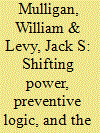|
|
|
Sort Order |
|
|
|
Items / Page
|
|
|
|
|
|
|
| Srl | Item |
| 1 |
ID:
174122


|
|
|
|
|
| Summary/Abstract |
International relations scholarship overwhelmingly expects that relatively rising states will threaten and challenge declining great powers. In practice, however, rising states can also cooperate with and support declining powers. What explains the rising state's choice of policy? When do rising states support or prey on declining great powers, and why do such strategies vary across time and space? The answer depends on the rising state's broader strategic calculations. All things being equal, a rising state will generally support a declining power when the latter can be used to offset threats from other great powers that can harm the rising state's security. Conversely, when using a declining state to offset such challenges is not a plausible option, the rising state is likely to pursue a predation strategy. The level of assertiveness of support or predation, meanwhile, depends on the declining power's military posture: the stronger the declining state is militarily, the less assertive the rising state tends to be. A review of the strategies adopted by two relatively rising powers, the United States and the Soviet Union, toward a declining Great Britain after 1945, and of a rising United States vis-à-vis a declining Soviet Union in the late Cold War, illustrates how this argument outperforms explanations that focus instead on the importance of economic interdependence and ideology.
|
|
|
|
|
|
|
|
|
|
|
|
|
|
|
|
| 2 |
ID:
118656


|
|
|
|
|
| Publication |
2012.
|
| Summary/Abstract |
There is general consensus in scholarly and policy circles that the global aid regime is undergoing major changes. Analysts have examined the emerging trends in development cooperation, and have identified the 'emerging donors' and other 'non-DAC [Development Assistance Committee] donors' as the source of important quantitative shifts in global aid flows (Manning 2006). Some scholars have described systemic fracturing in the established global aid regime (Woods 2008), while others have discussed the declining effectiveness of the traditional donors, a weakening of the so-called 'Washington Consensus' or the decline in the conventional structures of the aid delivery mechanism led by the Organization of Economic Cooperation and Development (OECD) DAC (Lancaster 2007; Birdsall and Fukuyama 2011; Chaturvedi et al 2012). There is a burgeoning literature around the impact of the rising states on Africa, in trade, aid and investment, society and politics, especially China's impact (Taylor 2006; 2008; Alden 2007; Rotberg 2008; De Haan 2010; Krageland 2011). Yet much is to be done in terms of systematically and critically analysing the details of the policy intentions, political-economic motivations and programing objectives of the BRICS (Brazil, Russia, India, China and South Africa) as aid providers and their impact on the less developed countries.
|
|
|
|
|
|
|
|
|
|
|
|
|
|
|
|
| 3 |
ID:
153326


|
|
|
|
|
| Summary/Abstract |
If a declining state has incentives for preventive war, the rising state should have incentives to delay a confrontation until it is stronger. We develop the theoretical paradox and examine the July 1914 crisis. Why did Russia, rising relative to Germany, not adopt a buying-time strategy? We argue that although most Russian leaders hoped to avoid a confrontation, they feared that the failure to support Serbia would lead to a loss of Russian credibility and a significant setback to Russia’s position in the Balkans, one that could not easily be reversed, even with Russia’s expected increase in relative military power.
|
|
|
|
|
|
|
|
|
|
|
|
|
|
|
|
|
|
|
|
|